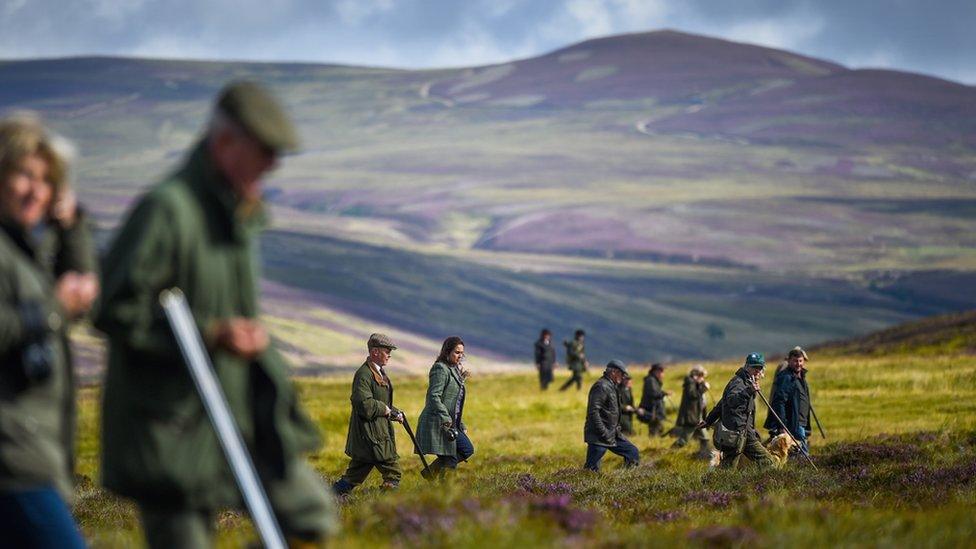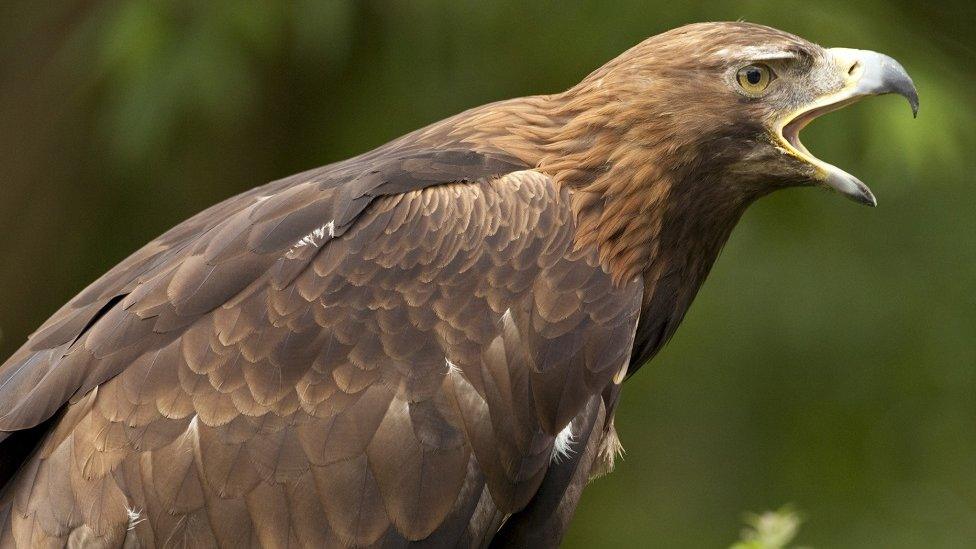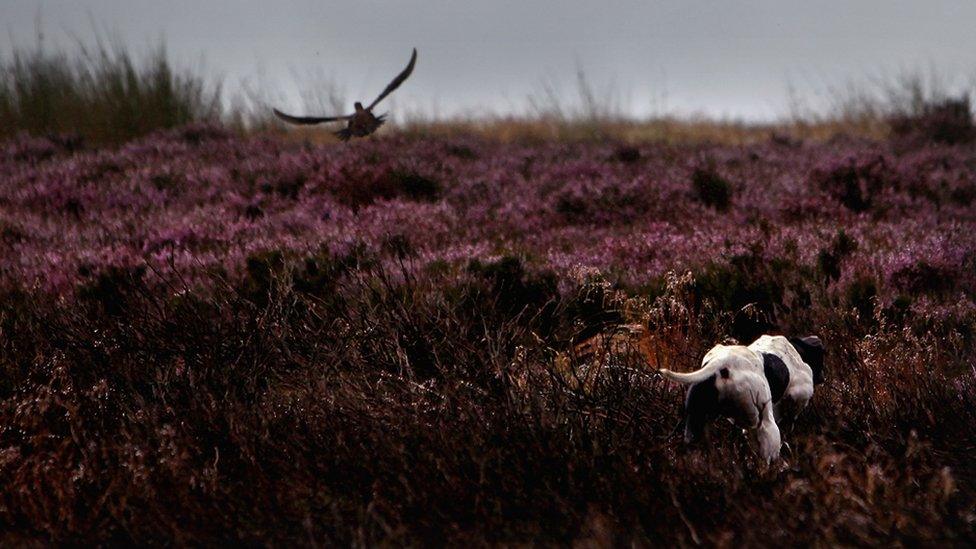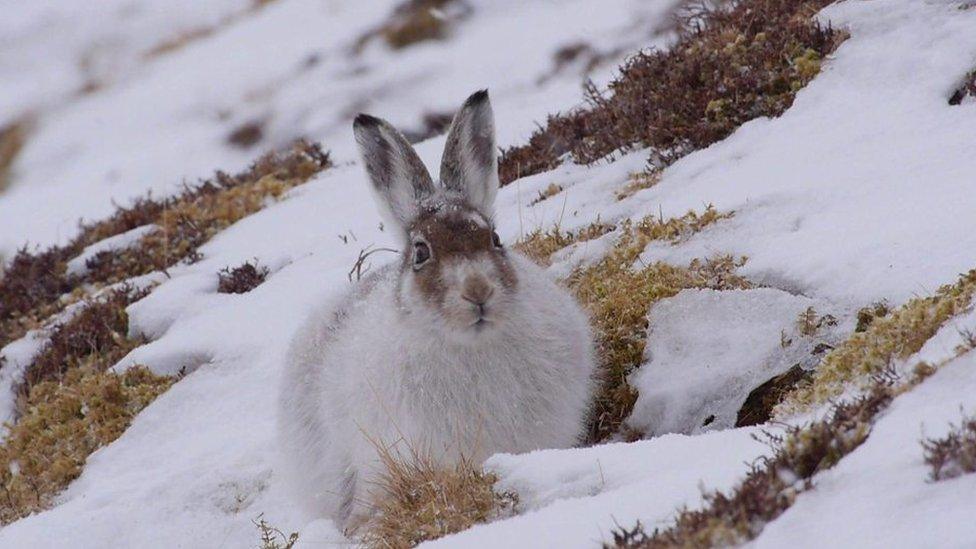Review says estates should be given ultimatum over raptor persecution
- Published

Land managers are opposed to a licensing scheme for grouse shooting
Scottish estates should be given five years to demonstrate a "measurable" reduction in illegal raptor persecution or face the introduction of licensing for grouse shooting, a review has said.
Land managers oppose licensing and fear it would make businesses unprofitable.
A review said the move would be needed if there was not a "marked improvement in the ecological sustainability of grouse moor management".
The Scottish government said it would consider the recommendations carefully.
Environment Secretary Roseanna Cunningham added that if a licensing scheme was required, it should be introduced earlier than suggested by the review.

A report had highlighted the disappearance of tagged golden eagles
Land managers said the recommendations would mean a "seismic change" in the way grouse moors are managed.
The two-year review, led by Professor Alan Werritty,, external was ordered after a report by Scottish Natural Heritage (SNH) concluded that a third of satellite tagged golden eagles had disappeared suspiciously.
Its remit was to look at grouse moor management more broadly after concerns were also raised by conservationists about muirburn and the culling of mountain hares.
Muirburn is the practice of setting fire to strips of land to create a patchwork of habitats in which ground-nesting grouse can live.
The report said ministers should increase regulatory control of the Muirburn Code, external and give SNH powers to monitor whether estates are sticking to it.
'The only way forward'
Professor Werritty said: "Our remit invited us to make recommendations to reduce the illegal killing of raptors but, at the same time, to give due regard to the socio-economic contribution that grouse shooting makes to Scotland's rural economy. Both topics have proved complex and problematic.
"In order to have a unanimous recommendation on this key issue with the authority that implies, the group proposes a five-year probationary period for specified raptors on or near grouse shooting estates to recover to a favourable conservation status.
"Should this target fail to be achieved, licensing should be introduced immediately. We all agree that it is the only way forward in that situation."

Licensing would require estates to complete additional paperwork and submissions to organisations like SNH.
A row emerged last year after the renowned ecologist Dr Adam Watson, who has since died, published a report suggesting there had been a dramatic decline in mountain hare numbers since the 1950s.
Moorland managers said his findings were at odds with their own experiences and that culling was necessary to protect the red grouse from disease.
Professor Werritty's report said land managers should be required to report annually to SNH on the number of mountain hares that they both count and kill.
The study comes amid calls from conservationist for an end to mountain hare culls

There have been calls to end the culling of mountain hares
Ms Cunningham said it was important that the government gave "careful consideration" to the 16 recommendations in the report, alongside other evidence, before issuing its response.
"An important part of this will involve meeting key stakeholders to discuss the findings of the review, and we will publish a full response to the report in due course," said the environment secretary.
"At this early stage, however, I believe the option of a licensing scheme will need to be considered and - if required - implemented earlier than the five-year timeframe suggested by the review group."
RSPB Scotland gave a cautious welcomed to the report, but said the review did not go far enough.
'Seismic change'
Head of species and land management, Duncan Orr-Ewing, said: "It is very important to remember that the background to this review was the overwhelming evidence base of the link between serious organised wildlife crime and grouse moor management; the ever-intensifying management of this land to produce excessive grouse bags leading to the killing of protected wildlife; as well as public concerns about huge culls of mountain hares; and burning of heather on deep peatland soils.
"Addressing these issues is now even more essential to combat both the climate emergency and nature crisis, which were confirmed as priorities by First Minister Nicola Sturgeon earlier this year."
In a joint statement, five rural organisations including Scottish Countryside Alliance and Scottish Land and Estates said the report would mean a "seismic change" for grouse moors.
It added: "This report has recommended a barrage of measures that will leave the grouse shooting sector engulfed by legislation and red tape. On top of that, penalties for wildlife crime in Scotland are about to get much tougher.
"The sector has already willingly embraced change and improvements in how it operates. We believe further enhanced training and codes of practice covering muirburn, mountain hare management and medicated grit are the best solution rather than onerous licensing provisions and we will be seeking an urgent meeting with government to discuss these key areas."